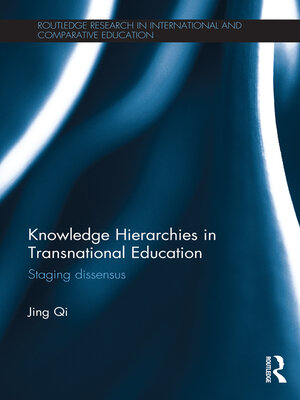Knowledge Hierarchies in Transnational Education
ebook ∣ Staging dissensus · Routledge Research in International and Comparative Education
By Jing Qi

Sign up to save your library
With an OverDrive account, you can save your favorite libraries for at-a-glance information about availability. Find out more about OverDrive accounts.
Find this title in Libby, the library reading app by OverDrive.



Search for a digital library with this title
Title found at these libraries:
| Library Name | Distance |
|---|---|
| Loading... |
Transnational education seeks equivalence in standards and/or relevance of outcomes through the transfer of Western theories, concepts and methods. Utilising a critique-interpretative approach, Jing Qi argues that equivalence/relevance-oriented approaches to transnational education assume the legitimacy of the global knowledge hierarchy. Euro-American educational theories are imposed as defaults in non-Western educational communities of imagined consensus.
Grounded in a study of a five-year transnational teacher education and community capacity-building program in Northern Chile, the book investigates the relationships between theoretical knowledge, knowledge hierarchies and critique. Transnational education communities are recognised as sites of critiques where conflictual and conceptual 'dissensus' disrupts global and local knowledge hierarchies. Critique is deployed by educational actors in their everyday engagement in transnational education to stage dissensus, which constantly re-draws the lines of possibility for knowledge co-construction.
A matrix mapping system is designed to chart and theorise the Chilean educational actors' critiques along the trail of concept translation, learning, application and innovation of knowledge hierarchies, which operate at and across global, transnational, local and the newly-created local-global levels. This book examines how these critiques modulate the ascendancy of knowledge hierarchies to enfranchise non-western educational actors for theoretical knowledge production that addresses local needs.
Knowledge Hierarchies in Transnational Education will be of key value to researchers, academics and postgraduate students in the fields of international education, teacher education and globalisation.







